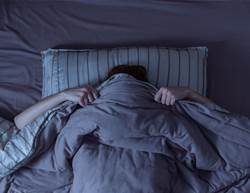As you grow up, you start to see your parents as people—not just fearless household leaders, but humans with their own quirks and misconceptions. You also begin to realise that some of their well-meant advice doesn’t always stack up against science. Here are five common myths you can stop believing right now.
1. Myth: If you pick up dropped food within five seconds, it’s safe to eat.
Mythbuster: Definitely not. “The five-second rule is very much not real,” says professor Donald Schaffner. His research shows that it takes less than a second for bacteria to transfer onto dropped food.
Which bacteria transfer depends on things like whether you wear shoes inside and what you’ve stepped in—think dirt, gum or worse, says Home Care and Cleaning Lab executive director Carolyn Forté. Then in winter, there's muddy patches and dirty water, all of which are “laden with bacteria and other germs,” she says.
The longer food stays on a contaminated surface, the more bacteria it picks up. Even small amounts of certain germs can make you sick, Schaffner adds. And trying to wash the food? Not helpful. “Washing food is not a very effective way of removing bacteria,” he explains.
Bottom line: Let it go. It’s not worth the risk.
2. Myth: Sugar makes kids hyper.
Mythbuster: Multiple large studies say otherwise. That slice of birthday cake probably isn’t the reason your child is bouncing off the walls. More likely, it’s the excitement of a party, a holiday or the anticipation of a treat that causes the high energy.
In fact, some research has found that only a small number of children may be sensitive to certain food dyes often found in sweets. Parental perception plays a role too—one small study showed that parents who were told their child had a sugary drink rated them as more hyperactive, even though the drink was sugar-free.
Of course, there are still plenty of good reasons to limit sugar in children’s diets. Too much added sugar increases the risk of obesity, tooth decay, heart disease and type 2 diabetes.
3. Myth: After shaving, hair grows back thicker and darker.
Mythbuster: Not true. Shaving doesn’t change hair colour, thickness or the number of hair follicles, says professor of pathology and dermatology Dr Kurt Stenn.
So why does freshly shaved hair feel stubbly and coarse? It’s because hair is naturally finer at the tips. Shaving removes those ends and exposes the thicker, blunter base, which can feel rougher to the touch.
Hair growth, texture and colour are influenced by genetics, hormones, age, medication and diet—factors that have nothing to do with whether you pick up a razor.
4. Myth: Gum stays in your stomach for seven years.
Mythbuster: Nope—there’s no sticky lump of chewing gum sitting in your stomach and there never was. Gum, like other things your body can’t fully digest (hello, corn kernels), passes through your digestive system and comes out a few days later, says gastroenterologist Dr Elena Ivanina.
That said, swallowing a large amount of gum at once—or regularly—can cause trouble. “A large wad could block your gut and lead to bloating, stomach pain, nausea, vomiting and an inability to pass gas or have a bowel movement,” Dr Ivanina says. That’s a medical emergency. Best to keep gum for chewing, not swallowing.
5. Myth: It’s not safe to swim too soon after eating.
Mythbuster: It might feel uncomfortable, but it’s not dangerous, Dr Ivanina says. A review of multiple studies found no link between eating before swimming and drowning risk.
So where did this myth come from? It’s based on the outdated idea that digestion diverts blood away from your muscles, supposedly making them cramp and increasing drowning risk. “Now we know the body is far more capable and complex—it can easily handle multitasking,” says Dr Ivanina.
Still, heading straight into the pool after a big meal could lead to indigestion or reflux, so you might want to give your stomach a little time before diving in.







_(1)_(1)_(1).jpg&h=193&w=250&c=1&s=1)


